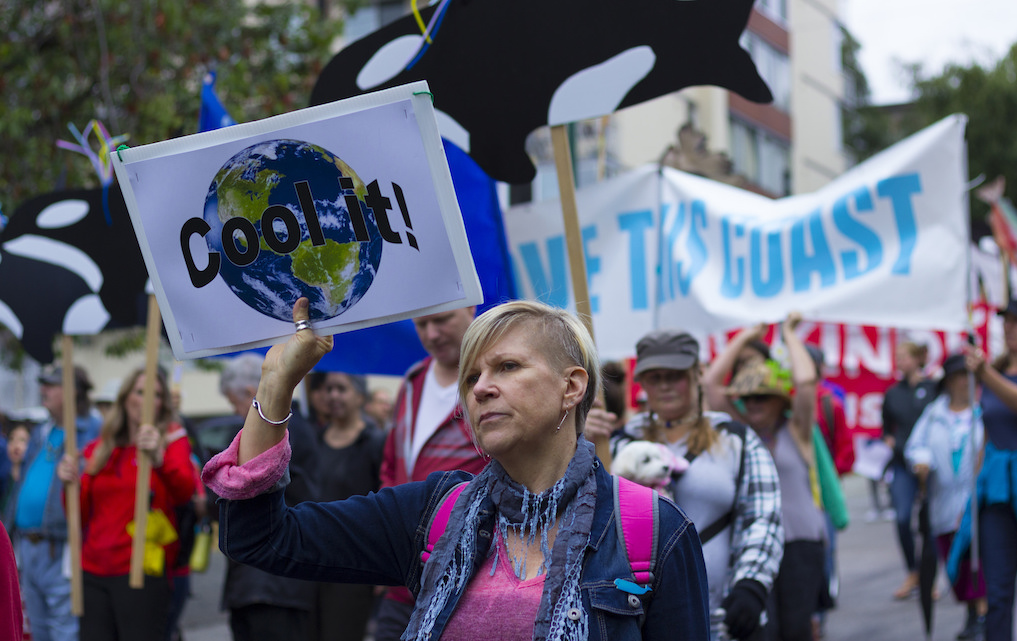We’ve got the chance, thanks be unto Donald J. Trump. Obviously, it’s time to get the heck out of NAFTA!
Why would I say such a wild thing? Well, as has been said here before, most actual evidence suggests that “trade deals” in general, and the North American Free Trade Agreement in particular, have very little to do with actual trade, which would happen anyway under the rules of the World Trade Organization. NAFTA is a corporate rights agreement engineered to keep a lid on workers’ rights and environmental regulation.
Case in point: the latest gambit in the continuing brouhaha about Kinder Morgan’s Trans Mountain pipeline expansion project.
If the pipeline isn’t built on terms Kinder Morgan likes, the CBC informed us on Tuesday, “the Houston-based company could go on the offensive to try to recoup billions of dollars.” How? “It would likely use NAFTA, since Chapter 11 of the agreement allows foreign companies to file compensation claims in countries where they have investments and believe a government action is unfair and discriminatory,” the CBC explained.
Now, whether this suggestion is being floated by Kinder Morgan as part of an effort to shake down the federal and Alberta governments, or by pipeline proponents in Ottawa and Edmonton to stampede British Columbia’s NDP government into an agreement is not yet 100 per cent clear, and may never be. But it’s important to note that the “unfair and discriminatory” problem Kinder Morgan would be taking action against if such an action proceeded could be summed up in a single word: Democracy.
This pipeline wouldn’t be a problem if large numbers of people in British Columbia, especially on the coast, were not opposed to it and saying so loudly, as is their right in a democracy. And it still wouldn’t be a problem if they hadn’t, you know, voted based on their views in the last British Columbia election in May 2017. This eventually led to the fall in the Legislature of the thereafter much-diminished B.C. Liberals (who are really modern neoliberal conservatives), and the swearing in of an NDP government led by Premier John Horgan in July 2017.
And it wouldn’t now be a problem for either Alberta Premier Rachel Notley or Prime Minister Justin Trudeau — both of them elected in 2015 in similar outbreaks of democracy — since the deal they thought they had with former B.C. Premier Christy Clark would have allowed the project to move ahead without impediments.
But that’s democracy, isn’t it? If you don’t like a government’s policies, you vote in a government with different policies at the first available opportunity. As Andrew Nikiforuk asked in The Tyee yesterday, “aren’t democracies supposed to challenge projects that impose unprecedented economic and environment risks on their citizens?”
Mr. Nikiforuk was arguing Kinder Morgan is looking for an exit strategy, and NAFTA gives it an opportunity fleece Canadian taxpayers while exiting.
So we now see precisely what we were warned about by opponents of the original Canada-U.S. Free Trade Agreement back before the deal was done in 1987 — to wit, that NAFTA is a mechanism of last resort to overcome the will of democratically elected governments and the people who vote for them when the marketplace of ideas interferes with the almighty market.
Now, I’m not an expert on trade agreements, so I can’t tell you if a compensation claim as described by the CBC and apparently contemplated by Kinder Morgan would work before a NAFTA panel.
What is clear is that a certain amount of “uncertainty” — supposedly anathema to business — is an inevitable outcome in jurisdictions governed by democracy. You can only have certainty of the kind Kinder Morgan seems to want if you can’t really change the government when you vote, the way “democracy” apparently works in the United States.
Since we still don’t know what the B.C. government is contemplating when Horgan says it will “use every tool in the tool box to defend B.C.’s coast, our economy and our interests,” it simply can’t be said that B.C. is sure to lose in court, as Alberta pundits keep insisting.
It depends, actually, on what the B.C. NDP’s law will say if it ever gets drafted. If the legislation merely requires Kinder Morgan to hand over its emergency plan — which the company has been reluctant to do — the court might well uphold it. And what happens then if the company doesn’t have a meaningful plan?
The CBC’s expert noted that even if Kinder Morgan’s problem is with the government and voters of B.C., under NAFTA the company would have to go after the federal government. Maybe that’s a good thing, since it’s Ottawa that’s trying to renegotiate NAFTA.
Trudeau’s intellectual heft seems each day more like that of a helium balloon, so I suppose this message should be directed to Foreign Affairs Minister Chrystia Freeland instead, since she seems to do the prime minister’s thinking for him:
Back away from the deal! Back away from the deal!
Either that, or stop pretending we’re a real democracy.
Of course, it’s also possible Kinder Morgan has overplayed its hand in a game of bluff because the brainiacs at head office in Houston never imagined that Premier Notley would come right out and say she’d buy a stake in the pipeline.
This could well have happened if it didn’t occur to them that Canadian New Democrats weren’t exactly the same as American Democrats, good neoliberals to the man and woman who would never utter such a proposal.
Corporate bosses sure as heck don’t want a government sharing their profit or, even worse, having some clout at the boardroom table!
They just want Canadian governments to do what any reasonable petro-tyranny would do: crush dissent.
This post also appears on David Climenhaga’s blog, AlbertaPolitics.ca.
Photo: William Chen/Flickr (Released under Creative Commons Attribution-Share Alike 4.0 International)
Like this article? rabble is reader-supported journalism. Chip in to keep stories like these coming.




